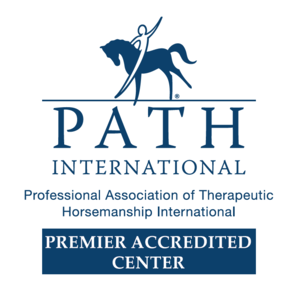Written by Crissy McCarthy
Similar to horses, humans are social beings that need connection and relationships with others to live a healthy, fulfilled life. When a child starts to show signs of delayed development in their social skills, it can be challenging for parents or caregivers to find appropriate yet fun ways to help develop those skills. The Occupational Therapy team at Little Bit offers a lesser-known program for young children in our Social Skills Classes.
Social Skills Class at Little Bit creates a safe environment for children of the same age group to engage in social learning activities with each other. The goal is to support the development of necessary skills for social interactions, such as self-advocacy, frustration tolerance, and collaborative problem-solving through structured play and equine-assisted activities.
Generally, the class is capped at four participants and runs for an hour. The team facilitating the class is led by the Little Bit occupational therapist or an occupational therapy assistant, alongside a Little Bit horse handler, and volunteers. The horsemanship component of the class either involves mounted activities, with one child at a time riding the horse, or unmounted activities, such as leading the horse through an obstacle course.
A typical social skills class starts with an energetic game for the kids to get the wiggles out, like red-light/green-light, or freeze tag. The group will then come together in a circle and check in on how each individual is feeling. An example of a common check-in activity is responding to the simple question “How are you feeling today?” or “What was the best part of your day today?” prompting participants to share in self-reflection and self-awareness. Check-in activities can also include a game of “Simon Says” to encourage active listening and speaking aloud in front of a group. All of these activities offer opportunities to increase social and emotional awareness and knowledge.
Once check-in is completed and the therapist can gauge where the energies are at that day, the class moves to another activity that focuses more on group dynamics and different ways to problem-solve. The therapist may read a book aloud and prompt discussion questions on the social situation the book presents, or how the characters are feeling. There may be a team-building activity, such as collaboratively planning out and building an obstacle course for the horse. Or, another fun activity allows the volunteers to act out a common social situation that presents a problem—such as accidentally hurting a peer during a game of tag, disagreeing on what game to play, or what happens when someone wants to play with the same toy. In watching these skits, the class participants are asked to evaluate the severity of the problem and come up with appropriate solutions. Regardless of the group activity, the primary goal is to facilitate the necessary social skills required of children in group settings.
After the group activity, the horse gets to come into the class! The equine component distinguishes Little Bit Social Skills Class from other therapeutic social skills classes by providing new and potentially challenging activities that require deeper self and group awareness. When the horse is brought in by a Little Bit horse handler, we often have a quick reminder on body awareness and a discussion on the observed behavior of the horse. The activities with the equine partner can vary. In mounted sessions, one participant may ride the horse and be prompted to pose in various ways, while the other participants observe and reflect on what the mounted individual is doing. In the unmounted class, participants may take turns leading the horse through an obstacle course, or watch the horse interact with various toys presented by the handler and talk about the behavior and reactions of the horse.
The purpose of equine-centered activities is to bring in a new, fun stimulus for the children that reinforces the social skills already practiced and emulated. As prey animals, horses are very attuned to group behavior and energies and will mirror these in their behavior. If the children are excited, the horse will sense that and might present with more energy, whereas if everyone is very calm, or perhaps tired, the horse might move slower and be more relaxed. While the children may not realize it, the equine-centered activities are designed so that participants can continue to practice their social skills and self-awareness.
Through Little Bit Social Skills Classes, these small groups of kids can develop friendships, but also help each other emulate what it’ll be like interacting with people outside of Little Bit, such as in school or at home. By observing and practicing skills with the support of volunteers and the therapist, the participants gain valuable experience in social situations to further their social development in their life outside of Little Bit.
Thank you to Kimberly Lind Photography (photos 2, 3, 4, 6, and 7)
Little Bit staff photographer all other photos













